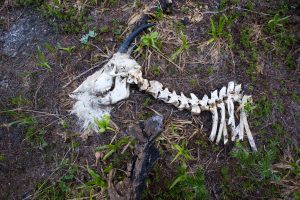In the final week of this class, I have decided to revisit the short fiction of Alice Munro. Out of everything that I have read in the course of my pursuit of this degree, Munro has had the greatest impact on me – in fact, Carrie Brown’s class “Chekhov and Munro: The Masters” was the deciding factor in my declaration of English and Creative Writing as my second major. Munro’s work is my personal ideal of a short story. This week, I have chosen to read two short stories from the collection Family Furnishings: “Too Much Happiness” and “Runaway.” In this post I will talk about “Runaway.”
“Runaway” is the story of a woman, Carla, who has found herself in an unhappy marriage to an emotionally abusive husband, Clark. With the help of her neighbor, Mrs. Jamieson, Carla is able to gather enough courage to board a bus to Toronto with the intention of finding a job there, but midway through the ride her resolve fails, and she calls Clark to come get her, telling him everything. Carla and Clark operate a riding stable together, and early on in the story we learn that their pet goat, Flora, has gone missing. This goat started off as Clark’s pet, but over time developed a special bond with Carla. After Carla’s return, Clark pays a visit to Mrs. Jamieson, who he is attempting to intimidate when Flora suddenly appears out of the mist. Clark never tells Carla this, and when he returns home Flora is not with him. Over the next few days, buzzards gather in a nearby clearing. Eventually Mrs. Jamieson writes to Carla again, apologizing for interfering in her life, and she mentions Flora’s reappearance. Carla burns the letter, and while she suspects what Clark has done, she never goes to the clearing.
“It was as if she had a murderous needle somewhere in her lungs, and by breathing carefully, she could avoid feeling it. But every once in a while she had to take a deep breath, and it was still there.”
Clark has never been physically aggressive toward Carla, as far as we know – but he could. He is a big man and quick to anger, and while he is never said to have gotten in a physical altercation with anyone, he makes a habit of intimidating others. He intimidates Mrs. Jamieson when he appears outside her home in the middle of the night, looming over her, and places his hand in her doorway to keep her from closing it. When he killed Carla’s pet and left the body for her to find, this is what he was doing. He is sweet to her after she runs away, as affectionate and “irresistible” as he was at the beginning of their relationship, because he needs to remind her of his value in her life before he will inevitably return to his true personality. He kills the goat to remind her what he is capable of. He says, in a joking manner, “if you ever run away on me again, I’ll tan your hide,” and Carla enjoys the joke. She will stay, at least for now, and ignore the reality of her situation because it is easier, and she doesn’t know how to live for herself rather than for him. When she chooses to turn back, this is what she says:
She could not picture it. Herself riding on the subway or street-car, caring for new horses, talking to new people, living among hordes of people every day who were not Clark.
A life, a place, chosen for that specific reason —that it would not contain Clark.
The strange and terrible thing coming clear to her about that world of the future, as she now pictured it, was that she would not exist there. She would only walk around, and open her mouth and speak, and do this and do that. She would not really be there. And what was strange about it was that she was doing all this, she was riding on this bus in the hope of recovering herself. As Mrs. Jamieson might say—and as she herself might with satisfaction have said-taking charge of her own life. With nobody glowering over her, nobody’s mood infecting her with misery.
But what would she care about? How would she know that she was alive?
While she was running away from him—now—Clark still kept his place in her life. But when she was finished running away, when she just went on, what would she put in his place? What else—who else—could ever be so vivid a challenge?
Carla quite literally cannot envision a life without him, that is how large his influence is. She has no life outside of him – she ran away from home and cut off all contact with her family to be with him. She has no real friends – Clark ensures this. When Carla has started to befriend Mrs. Jamieson, he becomes fixated on the idea of forcing Carla to blackmail the woman. While this never happens, by the end even she, who cared for Carla and wanted to help her be free, is gone, having moved to the city. In Mrs. Jamieson’s letter, she says that she “had made the mistake of thinking somehow that Carla’s happiness and freedom were the same thing. All she cared for was Carla’s happiness and she saw now that she – Carla – must find that in her marriage.” This reflects Carla’s feelings well. She does not feel that she can have both freedom and happiness, so she chooses happiness. When she thinks about her goat, she thinks about her free somewhere. She could go to the clearing and find the bones, thus acknowledging her reality, but she chooses to imagine that she is free. She “holds out against the temptation.”
